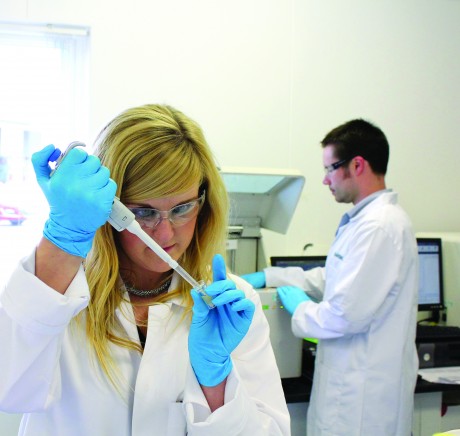
DONEGAL based scientists have been at the heart of research which has lead to a major breakthrough in the diagnosis of bowel cancer.
The collaboration between researchers from the Biomedical Diagnostics Institute at Dublin City University and biotech firm Randox Teoranta in Dungloe, promises that the new test will be a significant breakthrough in the diagnosis of bowel cancer and could be available for widespread use by the end of next year.
Bowel cancer is Ireland’s second biggest cancer killer and on average, 79 people in Donegal are diagnosed with bowel cancer each year.
The scientists are developing a new €25 blood test for bowel cancer, which could save thousands of lives by spotting the disease at the earliest possible opportunity. The simple check will pick up on antibodies in the blood, produced as the body reacts to the onset of bowel cancer.
Studies show that the identification of these very specific biomarkers will allow for a test which is more sensitive and accurate than existing screening. This means it will not only save lives, through earlier, more reliable and faster diagnosis, but because it is a simple blood test, it is hoped it will encourage more people to come forward for bowel cancer screening.
Each year almost 2,500 people are diagnosed with bowel cancer, with 1,000 dying from it; making bowel cancer the second most common cause of cancer death in Ireland. To address this, a nationwide Bowel Screen initiative has been rolled out to check those between the ages of 60-69, thought to be at high risk. This screening involves testing traces of blood in stool samples. Drawbacks associated with this method, known as Faecal Occult Blood Test (FOBT), include low sensitivity, which means early stage disease is not detected in a rapid or reliable way. In addition, the nature of the sample required for these tests has resulted in worryingly low levels of patient uptake. The new blood test will do away with the need for FOBT and will prevent unnecessary and costly colonoscopies for people without the disease.
Professor Richard O’Kennedy, Scientific Director of BDI said: “Typically patients who experience the symptoms of bowel cancer may visit their doctor. This new, quick and non-invasive test will help in identifying patients with bowel cancer earlier, so they are sent for colonoscopy and thus treated more effectively.
“Survival rates from bowel cancer are closely associated with the stage at diagnosis. More than half of people with bowel cancer are diagnosed in the later stages, requiring more complex treatment, with a poorer chance of survival. The aim of this new test is to find the cancer at the earliest possible stage, when it is easier to treat, improving outcomes for patients.”
The new test will be implemented on Randox’s proprietary Biochip Array Technology detection platform. Randox Teoranta Managing Director, Dr Peter FitzGerald said: “The potential here is quite revolutionary, while bowel cancer is a very serious illness – early diagnosis leads to improved survival. If bowel cancer is found early, the growth is typically small and can be removed, leaving the person healthy and needing less treatment. In addition bowel cancer places considerable burden on our healthcare system. Stage 3 bowel cancer treatment costs are estimated at more than €45k per patient, with Stage 1 treatment €18,550 – less than half, if we can catch this cancer early and treat it early, then the economic benefit will be considerable.”
Dr Sinéad Walsh, Acting Head of Research at the Irish Cancer Society, which is the largest voluntary funder of cancer research in Ireland said:
“We are very excited by the results of this research as it will help us move another step forward in our strategy towards a future without cancer. The earlier bowel cancer can be detected the better the outcome for patients. This coupled with the ability to personalise treatments for bowel cancer patients, will contribute to better outcomes for people with bowel cancer.”
The collaboration is funded by Enterprise Ireland and Randox. Initial work was supported by Science Foundation Ireland and carried out at Dublin City University and the Royal College of Surgeons Ireland and Beaumont Hospital. The inputs of Dr. Gregor Kijanka, Dr. Julie-Anne O’Reilly, Dr. Barry Byrne and Professors Elaine Kay and Dermot Kenny were vital in developing this research.









